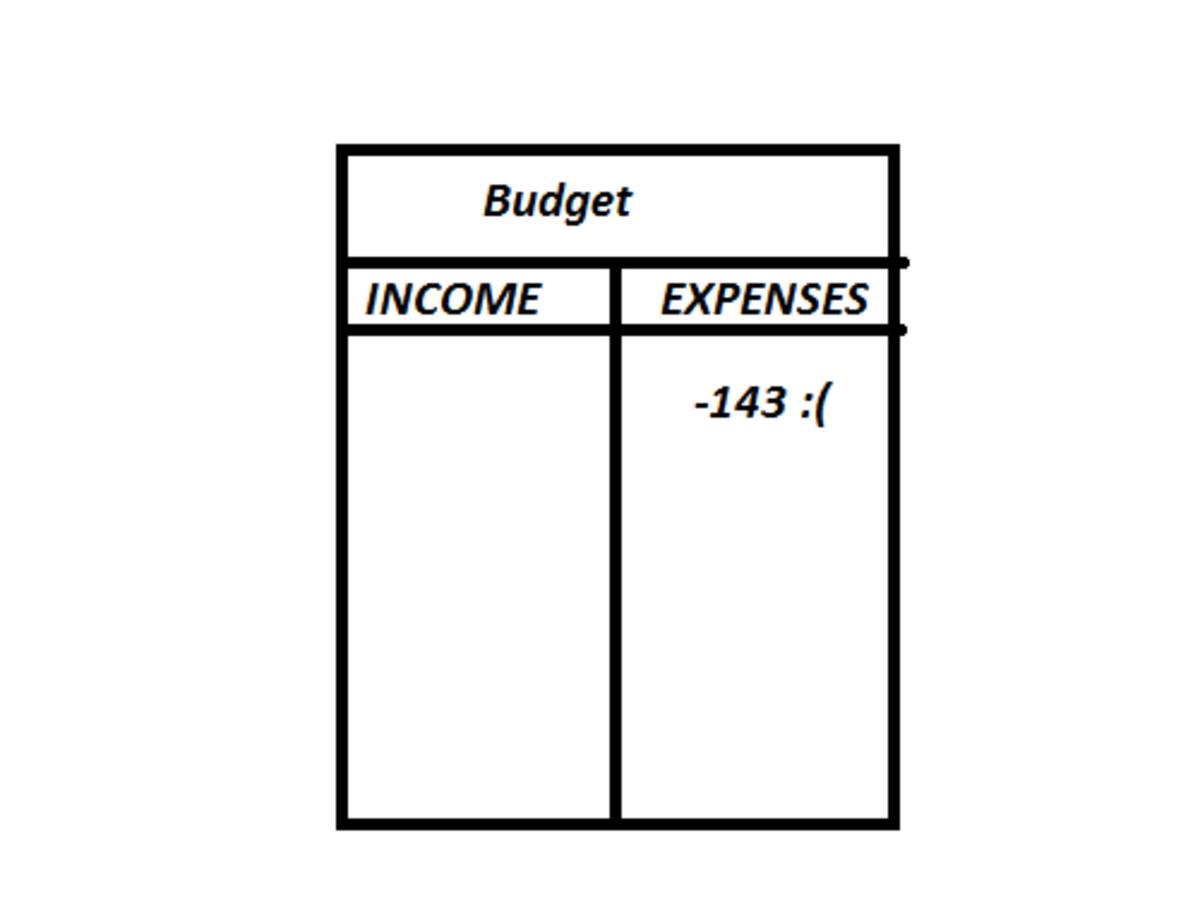An Idiot's Guide to Managing Money

Disclaimer - I don't know diddly about managing my money!
It's true! So why, then, would I be writing on this subject? Well, for starters because it is one of my goals for 2009 to write a hub on each and every hubmob weekly topic, so even though I am now, always have been, and probably always will be, a complete idiot when it comes to finances, I am going to give this a go. Plus, I actually know a fair amount about such subjects, it's just that I have a hard time taking my own advice when it comes to money management.
The Best Way to Make Money Is The Old Fashioned Way - Work!
I know the ultra-conservative neo-nazi fascist pigs out there would love to believe that every family on welfare is secretly living the high life on the public dole, but let me tell you, nothing could be further from the truth. Welfare, or Transitional Aid for Families in Need (I think that's what TANF means), is barely a subsistence level existence. And the notion that having more babies is going to help is laughable. Sure, you'll see an increase in your monthly TANF check, but it will not come close to matching the increased expenditures that new member of the family for whom you are now responsible will incur.
So the bottom line is that if you want security for your family, getting a job is the biggest step you can take toward financial security. Of course, that's easier said than done, in today's economy. That does not give you permission to sit on your butt and wait for things to get better. Instead, you should be starting your job search immediately! Start networking! Go to job fairs! You never know which contact you make today that may result in an opportunity down the line.
I'll give you an example. I am presently teaching for the University of Phoenix Online. I love online teaching because you can't beat the commute, I get to work at home and be there when my kids get off the school bus, and as long as I have a computer with an internet connection, I'm golden. I got my foot in the door last year when the University of Phoenix needed people with communications and journalism background to teach one of their introductory classes, called "Contemporary Business Communications." I believe that just about every new student to enroll in Axia College of the University of Phoenix must take this class, whether they want to or not. So as long as I do the job that is expected of me, I've got job security. Online education is booming, for the same reasons why I love teaching online.
Some time ago, and I'm not real sure when, I apparently sent a copy of my curriculum vitae (an educator's expanded resume) to DeVry University online. Earlier this afternoon, I checked my email, and it turns out that DeVry matched my qualifications against their needs, and found a match. So I received an invitation to submit additional information about my teaching and professional experience, with the hope that I can teach Interpersonal Communications for DeVry.
A Poor Economy Is A Great Time To Pursue A Degree
The reason why people like me are getting work for these online programs is because many people who are either unemployed, underemployed, or afraid they'll become either of the above, decide that the time is now to go back to school and get their degree. But they don't want to uproot their family, and if they are employed, they don't want to quit their job just to pursue a degree. So the solution is to take classes from the comfort of your own home, online. You could also take classes at a local community college, as most of them tend to be pretty affordable. A degree will make you that much more marketable when the economy improves (and it will, it always does, even after the Great Depression).
The Next Topic - Taxes
The worst way to manage your money is to let the government take extra money out of your paycheck every week or two, depending upon how often you get paid. Sure, I'm the first to admit that a near sexual thrill overcomes me when I get my tax return back, but in reality what has happened is that you've let the government take your money, use it to pay for $200 toilet seats, and then give it back to you a year later, without interest. Instead, the best way to manage your money is to have just enough money withheld from your check so you can break even, or perhaps get a small tax return. In that way, you'll be keeping more money in your pocket on a paycheck-by-paycheck basis, which you can use to buy your own $200 toilet seat, if that's what you want to do. The bottom line (no pun intended) is that it's always better in a bad economy to have access to every dime you have at your disposal.
While we're talking about taxes, I've got to say a word about the Earned Income Credit. When I get my taxes back, just about all of the return (which I actually mailed out today) will be in the form of the Earned Income Credit. The amount of your credit depends upon how much or how little earned income you actually had, your family size, etc. It's a great way to really blow up that return, but you have to be careful to be honest about your income. If our friendly auditors at the IRS find that you have exaggerated your income in order to qualify for a higher earned income credit, there can be serious consequences, not the least of which is that they can ban you from taking the credit in future years (I think it's two years, but I could be wrong there). The important thing, as I said before, is to be brutally honest, and in the end, you'll have some gravy to put on your mashed potatoes.
This is HUGE! Check Your Credit Annually!
A couple years ago, I started getting into the habit, just after New Year's, to request copies of my credit report from all three of the major credit reporting agencies. These companies - TransUnion, Experian and Equifax - make their money by selling reports on you to potential employers, landlords, bank officers, etc. The quality of their report, therefore, is inextricably linked to how much value any of those potential clients place on the information. In that regard, each of those companies actually want people to dispute information contained in their credit report if in fact it is erroneous. Depending upon whom you talk to, up to 80 percent of all credit reports contain at least one error.
It is against the law to try to mislead the credit bureaus to remove items from your credit report when it is actually accurate. Fortunately, though, they give you options you can choose from, including one where you can stipulate that you have no knowledge of a particular debt. Such a claim is very nearly impossible to refute, because it's impossible to know what a person can or can not remember. Therefore, when you go through your personal credit report, paying particular attention to the negative items listed, if you have any doubt about whether a particular debt is actually yours, it is in your interest to dispute it. In an initial dispute, the less you say the better. The credit bureaus then have 30 days from the day you submitted your dispute, to contact the creditors and verify the information. If they do verify the information, sometimes the items are updated, to reflect interest that has accrued, or perhaps to reflect payments you may have made to reduce the debt.
If a creditor can not provide documentation within 30 days that you owe this money, by law the item must be removed from your credit report.
The down side of this approach, challenging everything under the Sun, is that once an item has been verified, if you challenge the debt again, particularly too soon, the credit bureau can legally refuse to verify your debt, labeling it "frivolous," since they just jumped through the hoops to prove it was your debt.
Sometimes, however, it is appropriate to contact the creditor directly. I'll give you an example that showed up on my credit report when I pulled them for 2009. According to the TransUnion report, I had a collections debt for over $300 to Maine Medical Center. I checked with Maine Medical Center to find out when this debt was incurred, and they said it was February of 2007. The problem was that in February of 2007, I had full health insurance. So I contacted my insurer and verified that my insurance was, in fact, in force on the date of service.Then I called back Maine Medical Center and informed them that they should have been paid by my insurance company, and added that this negative item on my credit report was affecting my ability to get affordable credit today.
In the end, Maine Medical Center agreed to drop the debt, as it was their error in billing that resulted in not being paid for the service, and they notified their collections agency that the matter had been resolved. All-in-all, I spent about a half-hour making phone calls, and I got that item permanently removed from my credit report.
You can also write letters to creditors and collections agencies, asking them to verify a debt. I have one item on my credit report claiming that I once bounced a check to some company in Seattle for some pictures. I know, based upon the date this check was allegedly written by me, that I did not even have a checking account at that time. So this is one that I am sending a certified letter to, asking them to verify the debt. I'm also asking them to provide me with a copy of the original check, so I can compare the signature on the check against the signature on my driver's license. I fully expect to find that this check was written by someone else with a similar name as mine, and ended up in my credit report.
Of course, the best way to improve your credit is to pay your bills. Even if you have accounts that have been charged off, you can pay off the debt and see your credit worthiness increase. Sometimes you can negotiate with a creditor or collections agency, and reach a deal whereby if you pay down the debt, meeting payment due dates, at the end of the process not only will the negative item be removed from your credit report, but you can also ask the creditor to agree to report it as a positive account. In an economy like we have today, creditors will be much more likely to make concessions like that as long as it results in their company getting money they had long since given up hope on collecting.
One last point about credit - for most negative items on your report, the longest they can remain on your report is seven years. Bankruptcies can stay on longer, up to 10 years, and public judgements by courts can stay on significantly longer (I believe 20 years, but don't quote me on that). So if you check your credit report and see that there is a collectons account on your record that is more than seven years old, you should immediately write to the credit bureau and remind them that the item must be removed from your credit report.
UPDATE!
I just received the results back from my challenges to accounts that appeared in one of my credit reports, and found that 10 items I disputed could not be verified. And in this case, it was not because the creditors simply ran out of time. They still had three days left before the items would have been dropped due to the 30 day requirement. So it pays to challenge items you believe to be inaccurate. Just because an item is on your credit report does not mean that you actually owe the money. Credit reports are generated by creditors and collections agencies that are run by human beings. Human beings are prone to making mistakes, and in this case, I would have been doing a disservice to myself by simply accepting the accuracy of these items.
Last, but certainly not least, we have investing!
There's always a safe place to put money you want to invest, but the key is to know where to put it, depending upon the condition of the economy. With the way the stock market has been going up and down like a manic depressant patient, now would not be the time to jump into the stock market. Real estate, too, is not a great option for the short-term because property values are down in most places. On the other hand, if you are looking for a bargain, and intend to keep the property for a while, this is a great time to buy. I contacted a realtor in Florida recently and found that this realtor alone has HUNDREDS of foreclosed, bank-owned properties, many of which can be had for less than the debt that was originally owed.
The key in this case is to have good enough credit in order to qualify for a mortgage, assuming you don't have cash on hand to buy the property outright. That said, there are plenty of properties in the greater Orlando area that you could buy for cash for what would normally be considered a healthy downpayment. The key, as I've heard it before, is to try to qualify for the best mortgage you can, with the smallest down payment you can get away with, as long as you can save the money for a rainy day, such as when you may lose your job and need a safety net.
Another area that is booming right now is precious metals. The problem is, it may be too late to cash in on that boom, because if you get into the gold market at $800 an ounce, you may not make as much money if the price is near its ceiling.
You also have the option of going with a mutual fund, spreading around the types of companies you invest in. I used to have a mutual fund that was split up four ways - 25 percent each for: aggressively managed, conservatively managed, utilities and common stock. By diversifying your portfolio, when the market drops, you've got a fighting chance to weather the storm on Wall Street.
So just remember, folks, that I am by no means an expert on money management, and anything I've said here could very well be worth less than, say, cow patties, and I strongly encourage anyone who reads this to check my facts with people who are not financial idiots and actually know what they're talking about.....of course, George W. Bush has an MBA, and he obviously didn't have a clue on the economy, so who's to say who is an expert these days?








